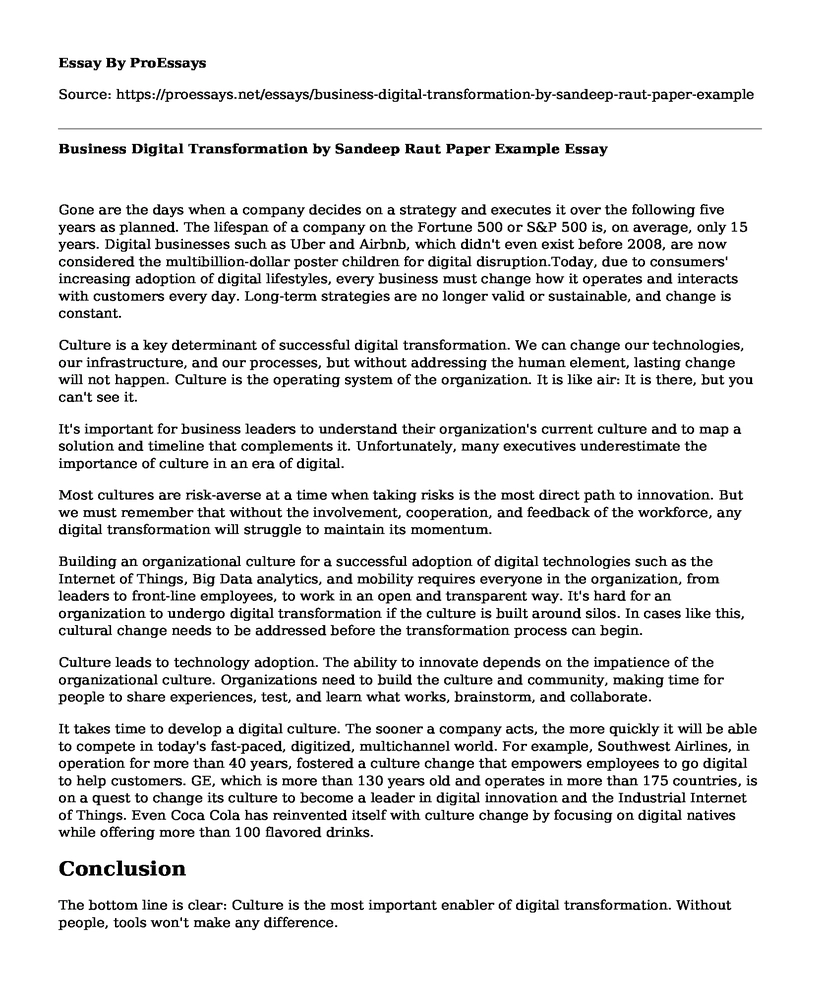Gone are the days when a company decides on a strategy and executes it over the following five years as planned. The lifespan of a company on the Fortune 500 or S&P 500 is, on average, only 15 years. Digital businesses such as Uber and Airbnb, which didn't even exist before 2008, are now considered the multibillion-dollar poster children for digital disruption.Today, due to consumers' increasing adoption of digital lifestyles, every business must change how it operates and interacts with customers every day. Long-term strategies are no longer valid or sustainable, and change is constant.
Culture is a key determinant of successful digital transformation. We can change our technologies, our infrastructure, and our processes, but without addressing the human element, lasting change will not happen. Culture is the operating system of the organization. It is like air: It is there, but you can't see it.
It's important for business leaders to understand their organization's current culture and to map a solution and timeline that complements it. Unfortunately, many executives underestimate the importance of culture in an era of digital.
Most cultures are risk-averse at a time when taking risks is the most direct path to innovation. But we must remember that without the involvement, cooperation, and feedback of the workforce, any digital transformation will struggle to maintain its momentum.
Building an organizational culture for a successful adoption of digital technologies such as the Internet of Things, Big Data analytics, and mobility requires everyone in the organization, from leaders to front-line employees, to work in an open and transparent way. It's hard for an organization to undergo digital transformation if the culture is built around silos. In cases like this, cultural change needs to be addressed before the transformation process can begin.
Culture leads to technology adoption. The ability to innovate depends on the impatience of the organizational culture. Organizations need to build the culture and community, making time for people to share experiences, test, and learn what works, brainstorm, and collaborate.
It takes time to develop a digital culture. The sooner a company acts, the more quickly it will be able to compete in today's fast-paced, digitized, multichannel world. For example, Southwest Airlines, in operation for more than 40 years, fostered a culture change that empowers employees to go digital to help customers. GE, which is more than 130 years old and operates in more than 175 countries, is on a quest to change its culture to become a leader in digital innovation and the Industrial Internet of Things. Even Coca Cola has reinvented itself with culture change by focusing on digital natives while offering more than 100 flavored drinks.
Conclusion
The bottom line is clear: Culture is the most important enabler of digital transformation. Without people, tools won't make any difference.
For more insight on digital transformation, see 2017: The Year Businesses Will Learn The True Meaning Of Digital Transformation.
Cite this page
Business Digital Transformation by Sandeep Raut Paper Example. (2022, Sep 11). Retrieved from https://proessays.net/essays/business-digital-transformation-by-sandeep-raut-paper-example
If you are the original author of this essay and no longer wish to have it published on the ProEssays website, please click below to request its removal:
- Paper Example on Ethical Leadership Working with Older Donors
- Managing Innovation and Entrepreneurship Chapters Analysis Paper Example
- Essay Example on Leadership Philosophy: Guiding Principles for Success
- Annotated Bibliography: Organizational Culture, Burnout, Bullying, and Nurse Turnover Intention
- Securing Information: Integrity, Confidentiality and Availability - Research Paper
- Risk Mitigation Through Employee Insurance: RBC Analysis - Essay Sample
- Value-Based Purchasing Models: Contribution to Management and Decision-Making - Essay Sample







